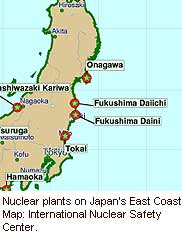
THURSDAY, March 31 (HealthDay News) — Almost three weeks after a massive earthquake and tsunami crippled four nuclear reactors in Japan, American public opinion on the risks and benefits of nuclear power hasn’t shifted much compared to three years earlier, a new Harris Interactive/HealthDay poll finds.
The U.S. public is almost equally divided on whether or not more nuclear power plants should be built on American soil, with 41 percent supporting the idea and 39 percent opposed. This represents only a slight change from three years ago, when 49 percent supported nuclear plants and 32 percent opposed them.
“The problems with Fukushima Daiichi nuclear plant have clearly influenced American attitudes to nuclear energy, but not by as much as I expected,” said Humphrey Taylor, chairman of the Harris Poll, a service of Harris Interactive. “Support for building more nuclear power plants in the United States is down,” he noted , but “that still leaves the public split, 41 percent to 39 percent, with 20 percent not sure. Most people recognize the potential dangers of nuclear accidents but continue to think that nuclear power plants are at least ‘somewhat safe.'”
This isn’t the first time a nuclear accident has influenced public opinion. According to previous Harris Interactive polls, in the mid-1970s, almost two-thirds of Americans were in favor of nuclear power. Following the 1979 Three Mile Island accident, however, only 47 percent were pro with 45 percent against.
In this new online survey of about 2,100 U.S. adults, conducted March 23 to 25, 73 percent of respondents believed that nuclear waste disposal remains a “major problem,” while 55 percent thought that the possible escape of radioactivity into the atmosphere is equally dangerous.
Again, these numbers were only slightly above those of a similar Harris poll from three years ago, when the ratio was 72 percent and 51 percent, respectively.
Almost a third of all adults (29 percent) still consider nuclear power plants “very safe,” with another 34 percent saying they are “somewhat safe.” In 2008, those numbers were very similar, at 34 percent and 33 percent, respectively.
Still, in the new poll almost half of all adults (46 percent) agreed that, “The risk of accidents and radiation exposure from nuclear power plants is too high to be acceptable.”
But most people seemed able to see both sides of the debate.
More than half (55 percent) agreed that “We need to build nuclear power plants because they do not produce greenhouse gases that contribute to global warming and climate change unlike those that use oil, gas or coal,” while 59 percent agreed that, “It is OK to build nuclear power plants if we build them far enough away from earthquake fault lines and areas with large populations.”
But when presented with the other side of the argument, majorities agreed that accidents similar to the one in Japan could also happen in the United States (74 percent), and that people living near nuclear power plants are more likely to develop cancer than people who live farther away (54 percent).
However, the relative equanimity of the American public may not be so surprising after all, especially given the thousands of miles that separate Japan and the United States, several experts noted.
“There’s this idea that a disaster unhinges people left and right,” said George Bonanno, a professor of clinical psychology at Teachers College, Columbia University in New York City.
But when the disaster is remote, “people tend not to be affected by the disaster unless they lost somebody in the disaster or have a preexisting psychopathology. So there’s no real lasting psychological impact,” he said.
“We are remote observers,” added Bonanno, who is the author of The Other Side of Sadness. “We go around our daily lives and tend not to think about those things very often.”
Ellin Bloch, a professor at the California School of Professional Psychology in Alhambra, agreed. “Psychologically, we pay attention to what’s right in front of us, so if you’re not in direct proximity to an event, then it seems further removed. You’re not going to see it as immediately impacting you,” she said.
Other factors that could be playing into a relatively muted fear response might include the fact that the health risks from radiation are not immediate, and that the American public is now overwhelmed with other world events, such as the situation in Libya and in Egypt.
“There’s so much going on in the news right now that [the Japan nuclear disaster], for better or worse, may have taken a back seat,” Bloch noted.
Nevertheless, spurred by the catastrophe in Japan, the U.S. Nuclear Regulatory Commission has initiated a review of nuclear power plant safety in the United States. And other nations are reviewing their use of nuclear power as well. Germany, in fact, has announced that it intends to wean itself off nuclear energy altogether over the coming decades.
More information
The U.S. Department of Energy has more on nuclear energy.

